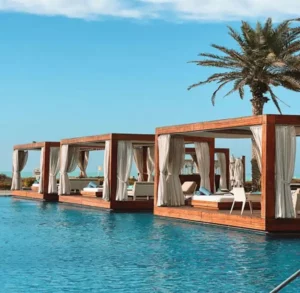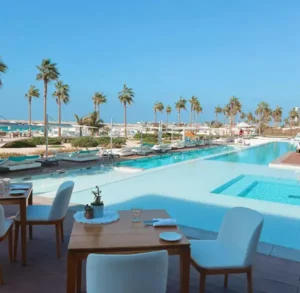What is luxury?
 When we look in dictionaries for the definition of the word “luxury” we find
When we look in dictionaries for the definition of the word “luxury” we find
“character of what is expensive, refined, sumptuous” according to the Larousse dictionary, then “a way of life which consists of practicing sumptuary and superfluous expenses” according to Wikipedia.
But the reality of the world of luxury goes beyond these simplistic definitions. Luxury is a sensory and emotional experience, where every detail is designed to amaze and delight.
In this universe, the ambiance is composed of a subtle blend of comfort and aesthetics, the materials are selected for their rarity and exceptional quality, while the architecture itself is a work of art. The products reflect artisanal or technological know-how pushed to its peak, embodying excellence and innovation.
Everyone can afford the pleasure of acquiring a luxury product, whether by purchasing a piece of haute couture clothing, a unique piece of jewelry, an exceptional pastry or even a night in a luxury hotel.
Luxury in the hotel industry is a know-how that generates an association of unique sensations. Each stay becomes an experience where comfort, personalized service and attention to detail create an atmosphere of absolute refinement. Luxury hotels are sanctuaries of tranquility and elegance, where every aspect, from interior design to amenities, is designed to deliver an unforgettable experience.
What is sustainability?
The United Nations defines sustainability as “meeting the needs of the present without compromising the ability of future generations to meet their own needs.”
Sustainable practices could then be defined as actions that we take with the aim of reducing their impact on the environment.
Which generally involves responsible management of natural resources, reduction of greenhouse gas emissions, preservation of biodiversity as well as promotion of ethical and equitable practices.
Climate change has become an increasingly crucial and urgent issue. The impacts of human activities on climate, such as rising temperatures, extreme weather events, and rising sea levels, are now indisputable and threaten ecological and socio-economic stability on a global scale. Faced with this reality, it becomes more and more difficult to continue as if nothing had happened. Efforts to integrate sustainability into all sectors of the economy, including industries traditionally associated with luxury such as hospitality, are essential to mitigate these effects and preserve a viable future for future generations.
At first glance the two definitions seem incompatible: luxury is often associated with ostentation, excess and hedonism, while sustainability is more linked to moderation and sobriety.
The impacts of luxury hotels on the environment
 The luxury hotel sector is one of the most energy-intensive, due to its massive energy consumption for heating, lighting, air conditioning and water management. Each night in a luxury hotel can require around 800 liters of water per room and generate almost a kilogram of waste per guest.
The luxury hotel sector is one of the most energy-intensive, due to its massive energy consumption for heating, lighting, air conditioning and water management. Each night in a luxury hotel can require around 800 liters of water per room and generate almost a kilogram of waste per guest.
In France, this sector alone consumes 18% of the average water consumption of the tertiary sector, which represents approximately 1/15 of the annual consumption of drinking water.
A guest’s daily water consumption in a luxury hotel can reach 300 liters, or double what they consume at home.
In terms of energy, according to ADEME (environment and energy management agency) the average energy consumption in tourist accommodation in France is 234 kWh per square meter per year, we can therefore imagine what energy costs represent in hotels depending on their size and especially during periods of high occupancy. The main sources of energy consumption in a hotel are air conditioning (15%), heating (31%), hot water (17%) and lighting (12%), they alone represent the three quarters of a hotel’s energy consumption.
The hospitality sector must also face the problem of food waste, which represents a very large part of the waste produced. In France, around 25% of food ordered and prepared in hotel establishments is wasted, which on the one hand increases the environmental burden, but on the other hand contributes to the general waste of food resources.
In Europe, food waste reaches around 20% of total food production, or around 173 kilograms per person, and the hospitality sector contributes 12%.
All these figures highlight the scale of the challenge facing the sector in terms of sustainability. With the importance of climate change today, it is now impossible to act as if we were not aware of the consequences of our behavior on the environment.
It’s the same for the hotel sector, they can no longer continue to act as if their actions had no consequences, integrating environmental practices into hotels has become essential, not only to meet the growing expectations of customers concerned about their ecological footprint, but also to satisfy the requirements of stakeholders such as suppliers, governments, regulatory bodies.
Balancing sustainability and luxury
The question that then arises is how to integrate environmental practices into luxury hotel establishments without losing this notion of luxury.
Luxury hotel guests come to these places to live an exceptional experience where refinement and comfort are paramount. They pay for this luxury side and are not necessarily ready to sacrifice their comfort for the environment.
The integration of environmental practices should therefore not call into question luxury but rather improve it by offering experiences that respect the environment.
Customer vision
According to a recent study by Booking, 70% of travelers are more likely to choose accommodation knowing that it is environmentally friendly. This shows a clear trend in guest accommodation preferences, where luxury is no longer just limited to high-end amenities, but also includes a strong commitment to sustainability and environmental responsibility.
We are therefore seeing an awareness on the part of customers who are increasingly demanding sustainable practices in luxury hotels, but without sacrificing quality and comfort.
Challenge for the sector: Reduce its environmental impact without compromising customer comfort
Hotels can incorporate environmental practices without compromising comfort and luxury for their guests, some measures can even go unnoticed while still contributing positively to the environment.
Reduce your water consumption
 In order to reduce its water consumption without affecting the comfort of its customers, the hotel can implement different strategies. He can install low-flow faucets and showers, which saves water and limits waste.
In order to reduce its water consumption without affecting the comfort of its customers, the hotel can implement different strategies. He can install low-flow faucets and showers, which saves water and limits waste.
He can also set up a wastewater recycling system to use it for non-potable purposes, it can be used for watering gardens, for air conditioning systems, decorative fountains, or any other system where the water does not need to be drinkable.
Reduce your energy consumption
 To reduce energy consumption, the hotel can implement a key card lighting management system in the rooms, where the lights are activated only after the card is inserted into the dedicated reader , turning off automatically when the card is removed. He can also install triple-thickness windows, which reinforces the thermal insulation of rooms and reduces heat loss in winter.
To reduce energy consumption, the hotel can implement a key card lighting management system in the rooms, where the lights are activated only after the card is inserted into the dedicated reader , turning off automatically when the card is removed. He can also install triple-thickness windows, which reinforces the thermal insulation of rooms and reduces heat loss in winter.
Incorporating solar panels on the property’s roof provides renewable energy to power a portion of the hotel’s electricity needs, reducing its carbon emissions.
Using LED lighting systems with low power consumption not only reduces electricity consumption but also extends the lifespan of bulbs.
Manage your waste correctly
To manage hotel waste and thus limit food waste, a hotel can adopt several effective strategies. It can set up a selective sorting system which separates recyclable waste such as paper, plastic and glass.
Implement a food waste reduction policy by working with suppliers to order the quantities needed and encouraging customers to only take what they can consume, which could minimize food leftovers.
Train your staff
It is crucial for a hotel to train its staff in environmental practices in order to ensure responsible management of resources and reduce its ecological impact.
These training courses aim to raise staff awareness of current environmental issues such as waste management, energy efficiency and water consumption. By providing them with practical skills and knowledge, the hotel reinforces its team’s commitment to sustainability and encourages responsible behavior on a daily basis.
Raise customer awareness
To raise awareness among guests, the hotel can include an informative leaflet in each room, which would aim to highlight the establishment’s sustainable initiatives, such as the use of LED lighting, the use of solar panels, etc.
The leaflet could also contain recommendations to customers such as not changing shower towels every day, there could be a code where if the customer puts their shower towel in the shower then that means they want it is changed, but conversely if the customer puts away their towel, or folds it, it is because they want to keep it, and this helps reduce the use of machines.
By providing clear information about these practices, the hotel encourages guests to actively participate in minimizing their environmental impacts while providing them with a comfortable and upscale stay experience.
Use sustainable materials
Using sustainable materials is essential for luxury hotels wishing to minimize their environmental impact while offering a refined setting. Opting for ecological materials such as FSC-certified wood, organic cotton, or even products made from recycled materials not only reduces the ecological footprint of the establishment, but also creates spaces that combine aesthetics and respect. of the environment. These choices contribute to a more responsible stay experience, without sacrificing comfort or elegance.
Responsible sourcing
Responsible sourcing is a key practice for luxury hotels wishing to reduce their environmental and social impact. By choosing local and ethical suppliers, the hotel can reduce transport-related CO₂ emissions and support local economies. This includes purchasing fresh, seasonal food, sustainable textiles, and eco-friendly furniture. This approach not only ensures product quality and traceability, but also creates an authentic and ethical experience for guests, while reinforcing the hotel’s commitment to sustainability.
Adopting these eco-responsible measures is becoming essential for the hospitality sector, allowing them to reduce their environmental footprint while meeting customers’ growing expectations in terms of sustainability.
These measures do not directly alter the luxurious character and do not call into question the excellence and comfort to which customers are accustomed. On the contrary, they enrich the experience by demonstrating a commitment to more responsible practices, thus creating added value that strengthens the hotel’s reputation and attracts customers who are increasingly concerned about the environmental impact of their stay choices. .
So luxury and sustainability compatible? Yes
Although looking at the definitions the two terms seem incompatible, they are in fact quite compatible. The concept of sustainability even becomes complementary and essential for the future of the luxury hotel sector.
On the one hand, for ecological reasons, it is essential to reduce the environmental footprint of hotel establishments. The luxury hotel sector, with its high consumption of water and energy and its often excessive wasteful practices, has a great deal of responsibility towards our planet.
By adopting eco-responsible measures, hotels can reduce their ecological impact while contributing to the preservation of natural resources for future generations.
On the other hand, they must respond to a growing demand from consumers who are today increasingly concerned about environmental issues, and who are looking for stays that reflect their values of sustainability and responsibility.

